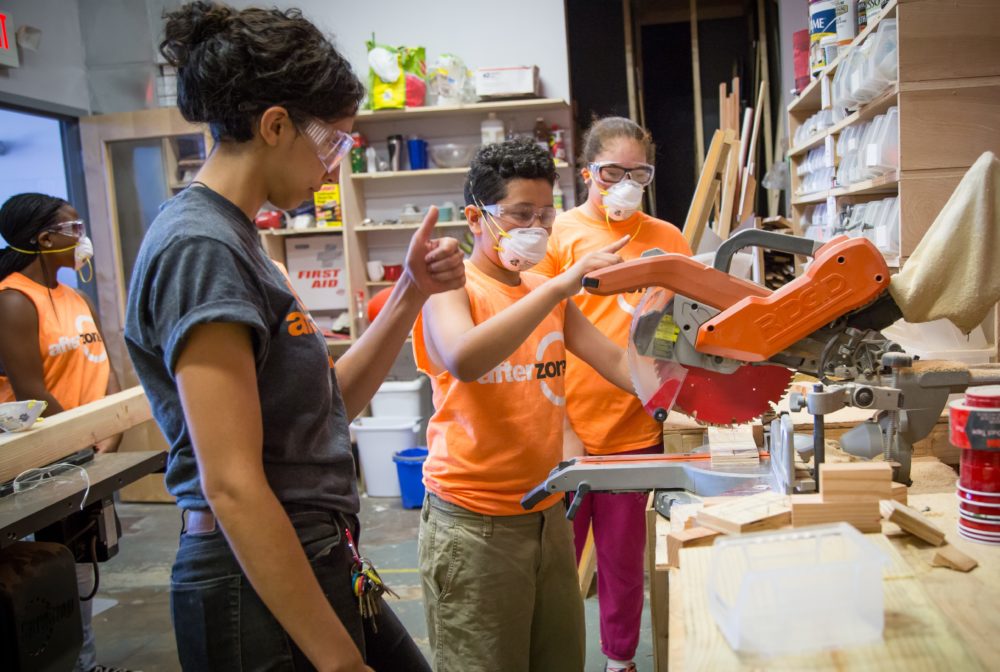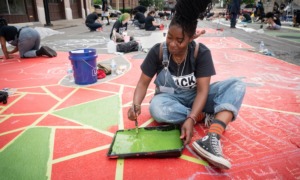
Cheryl Adams Johnston/PASA
Sixth, seventh and eighth graders are using a circular saw to build something they designed.
Youth need to participate in active learning opportunities that cultivate their interests and promote positive growth. Youth also need educational experiences that help broaden their awareness about the career pathways available to them, based on their own unique skills and abilities.
While the more affluent families in our society often pay for such opportunities — music or art lessons, sports, community service, etc. — lower-income families rarely can access these types of experiences. This negatively impacts the long-term success of lower-income youth in school and the workplace, including lower graduation rates and significant skill and labor gaps in the workforce.

Hillary Salmons
There is also a growing acknowledgment of and support for the interconnectedness of workforce skills and social emotional skills. Both skill sets rely on the ability to learn and apply knowledge, be responsible, think critically, work with others despite differences and use appropriate communication styles. It turns out that the necessary social emotional skills are the same ones that are necessary for employability.
As school systems recognize the importance of teaching a healthy mix of academic and social emotional skills, out-of-school time (OST) programs can help lead the way by providing young people with that full spectrum of experiences to prepare for their future. In connecting OST learning experiences with career pathways opportunities, OST programs have the chance to provide an ideal space to develop both social emotional and workplace skills for all youth, regardless of income level.
Operating out of five middle schools, in a school district where 86% of students live in poverty, the Providence After School Alliance (PASA) operates a middle school system called the AfterZone that engages 100 students annually with a year-round schedule of OST programming. These middle school programs take the first step in building career awareness for youth, exposing them to transformative experiences usually unavailable to young people from low-income communities — sailing, industrial design, urban gardening, rocketry, ocean science and more. The AfterZone’s emphasis is on building community partnerships and tapping into the strengths and resources of the community to expose middle school participants to experiences with real-world professionals, helping transform their interests into passions and their passions into long-term academic and professional possibilities.
Animal care, fashion and masonry
The Rhode Island Zoo runs a program called Pets & Vets where students learn about animal care and visit veterinary clinics and the animal rescue league to learn about animal-related careers. AfterZone’s Fashion Makers is taught by a fashion designer who has the youth design clothes, accessories and costumes for the school’s annual theater production. Feel the Power of Construction, offered by the New England Laborers’ Training Trust Fund and taught by faculty from the Providence Career & Technical Academy High School, shows middle school students masonry and bricklaying skills.
The Hub, PASA’s programming for high school students, works to expand students’ career exploration from initial awareness to preparation and training in a variety of settings. Students can enroll in career-related clubs or career-related courses for high school credit. Youth enrolled in the credit-bearing course who demonstrate proficiency in a set of key skills — critical thinking, communication, perseverance, engagement in learning and teamwork — receive a digital badge that showcases what the badge represents and what work the youth did to earn the badge.
Digital badges can be shared electronically with future employers or college admissions staff. Youth who earn a digital badge receive priority placement in city summer job programs, giving them valuable real-world job experience (and a paycheck!) related to their abilities and interests. As part of a new Aim High grant from New York Life, PASA is organizing teams of high school students and employer partners to visit the AfterZone to speak directly to middle school students about their high school experiences, about the city’s options for high schools and what career opportunities relate to their interests.
At a recent Arts Education Breakfast, where PASA brought together its community arts educators with professional artists, one of the youth panelists described how her middle and high school arts and design-related after-school programs helped shape her career ambitions and college selection. She described how after-school experiences at DownCity Design taught her power tool skills, design software and solidified her desire to learn calculus so she could become an engineer. Thanks to her career discoveries and experiences, she has been accepted to Smith College on a full scholarship to study engineering, proving that after-school learning can indeed help shape a student’s future path and passions.
When after-school systems team up with career pathway programs in schools and summer youth employment systems, we can help pave the way for young people who need experiences and caring adults to guide them through life’s many complex choices and opportunities. PASA’s middle and high school OST systems are helping youth, families and communities make sense of the options that need to be accessible to all young people.
Hillary Salmons is founder and executive director of the Providence After School Alliance. Before that she led an education initiative called Rhode Island Scholars and was vice president for program development for Health & Education Leadership for Providence.































